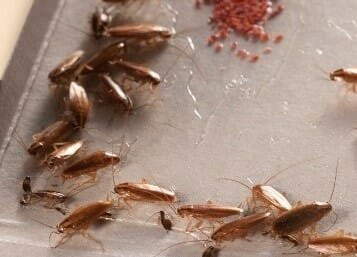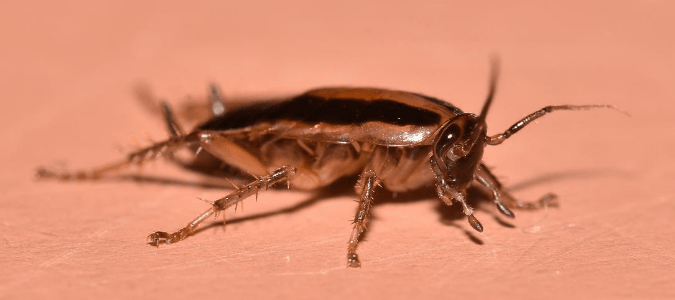Have you ever wondered what kills roaches overnight? If you’re tired of dealing with these pesky insects in your home, you’ll be relieved to know that there are effective solutions that can eliminate them while you sleep. In this article, we will explore some of the most powerful methods to exterminate roaches overnight, ensuring a roach-free home in no time. Say goodbye to these unwanted guests once and for all!
Natural Methods
Baking Soda and Sugar
One effective natural method for killing roaches overnight is by using a mixture of baking soda and sugar. Roaches are attracted to sugar, so mixing it with baking soda acts as a bait. The baking soda, when ingested by the roaches, causes a reaction in their digestive system that ultimately leads to their demise. To use this method, simply mix equal parts baking soda and sugar and sprinkle it in areas where roaches are often seen.
Boric Acid
Boric acid is another natural remedy that can effectively kill roaches. It disrupts the digestive system of roaches, leading to their eventual death. To use boric acid, sprinkle a thin layer in areas where roaches are commonly found, such as beneath appliances or along baseboards. Be cautious and keep boric acid away from children and pets, as it can be harmful if ingested in large amounts.
Bay Leaves
Believe it or not, bay leaves can also help in getting rid of roaches. Roaches are repelled by the smell of bay leaves, so placing them in areas where roaches frequent can help deter them. Simply crush a few leaves and scatter them around areas like kitchen cabinets, pantry shelves, or crevices where roaches may hide.
Coffee Grounds
Coffee grounds not only make your morning brew better, but they can also help in eliminating roaches. Roaches are repelled by the strong scent of coffee grounds. Spread used coffee grounds in areas such as cabinets, corners, or other hiding spots to keep roaches at bay.
Cucumber
Cucumbers may be a refreshing snack for humans, but roaches despise them. The strong odor of cucumbers repels roaches, making them an effective natural deterrent. Simply slice a cucumber and place the pieces in areas where roaches are likely to hide.
Catnip
While catnip may attract your feline friend, it has the opposite effect on roaches. The active ingredient in catnip, nepetalactone, is a natural repellent for roaches. Place small sachets of catnip in areas where roaches are present to repel them.
Diatomaceous Earth
Diatomaceous earth is a powdery substance made from the fossilized remains of diatoms. It is an effective way to kill roaches as it dehydrates their exoskeleton and causes them to die of dehydration. Sprinkle diatomaceous earth in areas where roaches are commonly found, such as along baseboards or behind appliances.
Essential Oils
Certain essential oils, such as lavender, peppermint, and tea tree oil, have been found to repel roaches. These oils can be diluted with water and sprayed in areas where roaches are present. The strong scent of these oils acts as a deterrent and can help in keeping roaches away.
Neem Oil
Neem oil, derived from the neem tree, has insecticidal properties that can be effective against roaches. Create a solution by mixing neem oil with water and spray it in areas where roaches are frequently seen. Neem oil disrupts the growth and reproductive cycle of roaches, leading to their elimination.
Peppermint Oil
Peppermint oil has a strong scent that roaches find unpleasant. By mixing peppermint oil with water and spraying it around areas where roaches are present, you can repel them. Additionally, peppermint oil also acts as an insecticide, causing damage to the nervous system of roaches.
Chemical Insecticides
Baits
Baits are a common form of chemical insecticide that can effectively kill roaches. They contain a toxic substance that is attractive to roaches and is ingested by them. The roaches then carry the poison back to their nest, where it is spread to other roaches, eventually leading to the eradication of the entire colony.
Sprays
Sprays are another popular choice for tackling roach infestations. They come in aerosol cans and can be directly sprayed onto the roaches or their hiding places. The chemicals in these sprays are toxic to roaches and can kill them on contact. Sprays are useful for quick and immediate elimination of roaches.
Aerosols
Aerosols are similar to sprays, but they are usually used to treat larger areas. They come in pressurized cans and release a fine mist that can cover a wider space. Aerosols are effective in targeting roach populations in larger rooms or outdoor areas.
Gels
Gels are a convenient and long-lasting method of roach control. The gel is applied in small dots in areas where roaches are likely to come into contact with it, such as cracks and crevices. The roaches are attracted to the gel and consume it, resulting in their death. Gels are especially useful for targeting hard-to-reach areas and for ongoing control.
Powders
Powders are another form of chemical insecticide that can be used against roaches. They are typically composed of a toxic substance that is sprinkled in areas where roaches are present. The powder sticks to the roaches’ bodies and legs, causing them to ingest it when they groom themselves. Once ingested, the powder is lethal to the roaches.


Home Remedies
Bleach
Bleach is a common household cleaning agent, but it can also serve as an effective roach killer. Mixing bleach with water and spraying it directly on roaches or in areas where they hide can kill them. However, bleach should be used with caution as it can also damage surfaces and can be harmful if inhaled or ingested.
Ammonia
Ammonia is another home remedy that can help eliminate roaches. Mixing ammonia with water and spraying it in roach-infested areas can be effective in killing them. However, ammonia has a strong odor and should be used in well-ventilated areas to avoid respiratory irritation.
Fabric Softener
Fabric softener can be used as a trap to kill roaches. Mix water with fabric softener and pour it into a shallow dish or container. The roaches will be attracted to the scent and will climb into the container. However, the slippery surface created by the fabric softener will prevent them from escaping, leading to their eventual drowning.
Lemons
Lemons can be used as a natural roach repellent. The scent of lemon is disliked by roaches, so squeezing lemon juice or placing lemon peels in areas where roaches are found can help prevent their presence. Additionally, lemon juice can also be mixed with water and sprayed around infested areas to repel roaches.
Traps and Repellents
Glue Traps
Glue traps are a simple and effective method of trapping and killing roaches. These traps consist of a sticky surface that captures roaches when they walk over it. Once trapped, the roaches are unable to escape, leading to their demise. Glue traps can be placed in areas of high roach activity, such as under sinks or near food sources.
Pheromone Traps
Pheromone traps are designed to attract roaches using synthetic pheromones, which mimic the chemical signals emitted by roaches to attract mates or mark trails. When roaches are lured by the scent, they enter the trap and are unable to escape. Pheromone traps are an effective tool for monitoring and controlling roach populations.
Ultrasonic Repellents
Ultrasonic repellents emit high-frequency sound waves that are undetectable to humans but are irritating to roaches and other pests. These devices are typically plugged into an electrical outlet and create a sound barrier that repels roaches. While ultrasonic repellents may help in deterring roaches, their effectiveness may vary, and they should be used in conjunction with other methods.
Electronic Traps
Electronic traps are a modern and convenient way to eliminate roaches. These traps use special bait to attract roaches and then electrocute them, effectively killing them. Electronic traps are safe to use and do not require the use of harmful chemicals or toxins.
Professional Extermination
Exterminator Services
If all else fails and you are unable to get rid of roaches using DIY methods, it may be necessary to call in professional exterminator services. Exterminators are trained in identifying and eliminating roach infestations using specialized equipment and techniques. They can provide effective and long-lasting solutions for roach problems.
Fumigation
Fumigation is a more intensive form of pest control that involves sealing off a space and introducing a fumigant gas that eliminates roaches. This method is typically used for severe infestations and requires professional expertise to ensure safe and effective treatment. Fumigation can be a highly effective solution for eliminating roach populations.
Preventive Measures
Maintaining Cleanliness
One of the most important preventive measures to keep roaches at bay is to maintain cleanliness in your home. Regularly clean up crumbs, spills, and food debris to minimize the potential food sources for roaches. Vacuum and sweep regularly to remove any potential hiding places or entry points.
Proper Food Storage
Roaches are attracted to food, so proper food storage is crucial in preventing infestations. Store food in airtight containers to keep it inaccessible to roaches. This includes pantry items, pet food, and even garbage. Empty and clean your trash bins regularly to remove any enticing odors.
Sealing Cracks and Openings
Roaches can enter your home through small cracks and openings. Inspect your home for any gaps or openings, especially around windows, doors, and utility pipes. Use caulk or sealants to repair these openings and prevent roaches from finding their way inside.
Removing Clutter
Roaches thrive in cluttered environments, as it provides them with ample hiding places. Regularly declutter your home and remove any unnecessary items or piles of paper. By minimizing these hiding spots, you can make it more difficult for roaches to establish themselves in your home.
Regular Pest Inspections
Conducting regular pest inspections can help identify potential roach problems early on. Consider scheduling regular inspections with a professional pest control company to ensure any signs of an infestation are detected and addressed promptly. Early detection can save you from dealing with a larger and more difficult infestation down the line.


Common Mistakes
Using Excessive Chemicals
Using excessive amounts of chemical insecticides can be counterproductive and potentially harmful to both humans and pets. It is important to follow the instructions on the product labels and use the recommended amount. Using excessive chemicals can also lead to roaches building up a resistance, making future treatments less effective.
Ignoring the Root Cause
Simply attempting to kill individual roaches without addressing the underlying cause of their presence is a common mistake. Roaches are often attracted to food, water, and shelter. Ignoring these root causes will allow the infestation to persist. It is essential to identify and eliminate these attractants to prevent future infestations.
Using Ineffective Products
Not all products on the market are equally effective against roaches. Using ineffective products can waste time and money. Research and choose products that have been proven to be effective against roaches, and read reviews from other consumers to ensure their efficacy.
Incomplete Treatment
Roach infestations require thorough treatment to be fully eradicated. Treating only one area or using a single method may not be enough to eliminate the entire population. It is crucial to develop a comprehensive treatment plan that targets the roaches’ hiding places, breeding areas, and food sources.
Inconsistent Approach
Consistency is key when dealing with a roach infestation. Treating the problem sporadically or only when you see roaches can lead to a perpetuating infestation. Stick to a consistent treatment plan, whether it is using natural methods, chemical insecticides, or a combination of both, to ensure maximum effectiveness.
Roach Behavior and Habitats
Nocturnal Nature
Roaches are nocturnal insects, meaning they are most active during the night. They prefer to hide during the day and come out in search of food and water under the cover of darkness. Understanding their nocturnal nature can help in determining the best times to implement preventive measures or treatments.
Preferred Environments
Roaches are highly adaptable creatures and can survive in various environments. However, they prefer warm and humid conditions. Areas such as kitchens, bathrooms, or basements provide them with the ideal conditions for survival. These areas often have access to food and water sources, making them prime roach habitats.
Feeding Habits
Roaches are omnivorous and will eat just about anything they can find. They are particularly attracted to starchy and sugary foods, meats, grease, and even non-food materials such as glue or soap. Roaches can survive for weeks without food, but they require water to survive.
Reproduction and Nesting
Roaches reproduce rapidly, making it crucial to act quickly at the first sign of an infestation. A single female roach can produce up to 400 offspring in her lifetime. Roaches lay their eggs in hidden areas and protected locations, such as cracks and crevices. Understanding their nesting habits can help in locating and treating their breeding sites.


Health Risks and Concerns
Allergies
Roaches can trigger allergies in some individuals. Their shed skin, droppings, and saliva contain allergenic proteins that can cause allergic reactions, including nasal congestion, sneezing, itchy eyes, and skin rashes. Individuals with asthma or respiratory conditions may be especially sensitive to roach allergens.
Asthma Triggers
Roach allergens can also act as triggers for asthma attacks in susceptible individuals. Exposure to roach allergens can worsen symptoms such as wheezing, coughing, and difficulty breathing. Controlling roach infestations and reducing allergen levels can help in managing asthma symptoms.
Food Contamination
Roaches can spread bacteria and contaminate food and food preparation surfaces. They can carry pathogens such as Salmonella, E. coli, and other harmful bacteria, which can lead to foodborne illnesses if ingested. Proper food storage and maintaining a clean kitchen environment are essential in preventing roach-related food contamination.
Spread of Diseases
In addition to food contamination, roaches can also transmit diseases through their feces and body parts. These diseases include dysentery, cholera, and typhoid fever. Roaches can pick up pathogens from unsanitary surroundings and transfer them to surfaces or food, posing a risk to human health.
Conclusion
Dealing with a roach infestation can be a frustrating and unpleasant experience. However, with the right approach, it is possible to effectively eliminate these pests from your home. From natural methods to chemical insecticides, home remedies to professional extermination, there are numerous options to choose from. Incorporating preventive measures into your routine can also help in preventing future infestations. Remember to consider the behavior and habitats of roaches, as well as the health risks they pose. With diligence and the appropriate methods, you can successfully eradicate roaches and create a roach-free environment in your home.
Your Expert in Animal Control and Extermination. Trust our experience for humane, effective pest management, protecting your property and ensuring peace of mind with Michael S.





